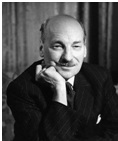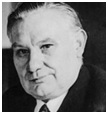|
 |
|
 |
Clement Attlee Leadership
Clement Attlee (1883-1967)
Attlee (pictured right) is often the experts' choice as the most successful post-war British prime minister (1945-51). His Labour government created:
These policies were accepted by both Labour and Conservative governments until they were challenged by Margaret Thatcher (prime minister 1979-90).
Why was Attlee such a great leader?
1. Change Attlee’s government radically changed Britain through
2. Quiet effectiveness Unlike Winston Churchill (pictured right), he wasn’t a great orator or charismatic hero. His success came from a quiet but determined resolution to achieve his aims, helped by:
Churchill unfairly called him “a modest little man with much to be modest about”.
3. Vision He had a vision of a fair and moral Britain, helping the poor and promoting the values of duty, responsibility and community before self-interest. He wanted to eradicate the misery and poverty of the 1930’s Depression.
4. Communicating the vision Despite his uninspiring oratory, he sold his vision because people believed in it. Churchill was admired for his wartime leadership, but he represented the old Britain with great divisions between rich and poor. So Attlee won the 1945 General Election by a huge majority.
5. Pragmatic idealism Attlee’s idealism was mixed with pragmatism and realism. His policies adapted to changing circumstances, particularly from 1947 to 1950 when economic difficulties necessitated:
He also wisely realized that Britain could no longer afford to be a world military power, or run an empire.
6. Teamwork He was a brilliant chairman, who united his Cabinet ministers through developing what he called a “group personality” despite their differences. His radical Welsh health minister, Aneurin (Nye) Bevan (pictured right above), was
particularly rebellious. Attlee encouraged his ministers to be concise and relevant, and he was excellent at quietly gaining support for his views with the help of his close political ally, Ernest Bevin (pictured right). Attlee said that the purpose of government is to make “clear, crisp, uncompromising decisions” as quickly as possible.
7. Empowerment Within the broad policy guidelines decided in the Cabinet, he gave his ministers the freedom to get on with their jobs. “You don’t keep a dog and bark yourself”, he said.
8. Luck His main rival to become leader of the Labour Party, Herbert Morrison (pictured right above), lost his House of Commons seat at the 1931 General Election. The British Labour politician, Peter Mandelson (pictured right below), is Morrison’s
grandson.
Key quotes on politics “Democracy means government by discussion, but it is only effective if you can stop the people talking”. “Judgement which is needed to make important decisions on imperfect knowledge in a limited time” (Atlee’s definition of the art of politics).
Key quote on Britain The British have the distinction above all other nations of being able to put new wine into old bottles without bursting them (describing the British ability to introduce new policies with old attitudes and institutions).
Key quote on ethics I believe that conscience is a still small voice and not a loudspeaker.
Key quote on economics If a rich man wants to help the poor, he should pay his taxes gladly |
|
|
||
|
|
|
||
|
||
| Copyright © wisdomtowin.com All Rights Reserved | ||
|







